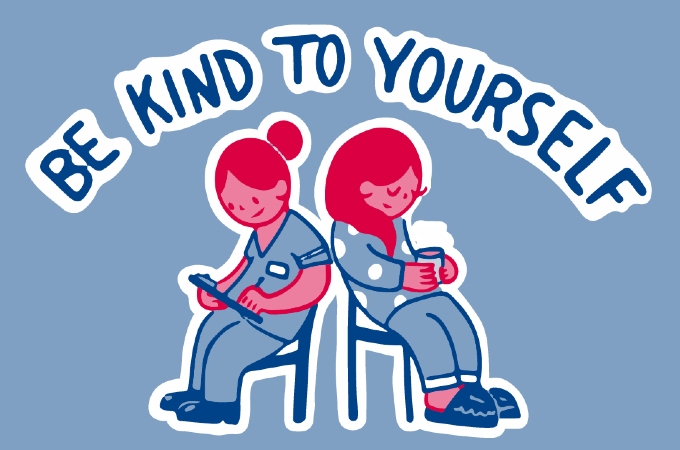As the psychological impact of COVID-19 takes hold, reps can play a powerful role in signposting to sources of support
It was inevitable that caring for patients in the high-stakes context of COVID-19 would take its toll on the mental health of nursing staff. But now, more than ever, the combination of exhaustion and trepidation about the scale of the second wave is having an impact on members’ ability to cope.
Reps’ work is being affected. Though many are managing fewer formal cases, such as disciplinaries and sickness absence, they’re receiving more calls from members seeking support. In some instances, reps could be the first person a member has felt able to speak to openly about their experiences at work during the pandemic, and these experiences may well have been traumatic or distressing.
Though it can be tempting to try to solve all members’ problems, it’s important for reps to signpost them to specialist psychological support. “We know how empathic our reps are,” says RCN National Officer Kim Sunley. “They want to do all they can, but it’s important that they protect their own mental health and don’t shoulder the emotional weight of what our members have been facing in these unprecedented times.”

Signposting to support
Kim says: “The most helpful thing reps can do is to be knowledgeable about the local and national psychological support available and to signpost to it with confidence. Equally, reps can play a role in supporting our members holistically, so recognising when they may need help with their mental health when they’ve come to seek advice on another issue.
“It’s crucial to identify the need for mental health support early, have an honest and empathetic conversation about it, but then lead members on to the specialist help they need.”
That support has been increased considerably in light of the COVID-19 pandemic. NHS People has introduced a confidential staff support line, operated by the Samaritans, which is free to access from 7am-11pm, seven days a week on 0800 069 6222.
There's also a confidential bereavement support line, operated by Hospice UK, which is also free to access from 8am-8pm, seven days a week on 0300 303 4434. To find out more, visit the NHS People website.
The RCN, of course, has its own resources. There is a dedicated webpage on COVID-19 and mental health, with links to self-care advice, mindfulness videos, free wellbeing apps and country-specific mental health support for nursing staff. Visit our mental health support webpage.
There’s also the RCN Counselling Service which offers brief therapy in six sessions to members for free. Members can make an appointment by calling RCN Direct on 0345 772 6100. Find out more.
There is no shame in feeling upset, traumatised and distressed by this. It’s a normal response to a very abnormal situation
Stopping the stigma
“We’re keen to promote the services now available from national organisations and to destigmatise seeking that support,” says Kim. “There is no shame in feeling upset, traumatised and distressed by this. It’s a normal response to a very abnormal situation. We must work to mend the disconnect between the availability of services and the uptake of them.
“Active members can play a role in raising awareness and acceptance of mental health issues in their workplace and promoting relevant support services. This could be via the staff intranet, newsletters, noticeboards, on laminated signs in toilets or staff rooms.
“Employers have a duty of care to their staff so should be taking active steps to minimise the impact of stress and working in partnership with reps to support and maximise their efforts.”
Kim added: “It’s our purpose as a trade union to ensure employers are doing all they can to protect the health and safety of our members. Mental health and safety is no exception to that.
“We want to prevent our members feeling poorly and reaching the point where they can no longer work. But of course, these are unfamiliar and stressful times for reps also. If you need advice, support and guidance in your RCN role, don’t hesitate to contact your supervisor in the first instance.”
Sources of national mental health support for nursing staff
- Visit the NHS People website (England).
- Visit the Public Health Agency website (Northern Ireland).
- Visit the Scottish Government website (Scotland).
- Visit the Health for Health Professional Wales website (Wales).
- Find out more about RCN support.
Reps can also find information on mental health support on our online COVID-19 resource for reps. Use your MyRCN details to log into our online learning portal or use the link in the RCN Reps Hub.
‘Mental health shouldn't be a taboo subject’
Ali Upton, Chair of the RCN UK Safety Reps Committee, says that safety reps can play a vital role in making sure employers are prioritising mental health and putting support in place
The mental health and wellbeing of nursing staff shouldn’t be a taboo subject. As the report Thriving At Work by Paul Farmer and Lord Dennis Stevenson highlights, our work can have a huge impact on our mental health and it’s crucial that employers prioritise mental health and wellbeing in the workplace and do more to support staff.
With many health care workers feeling the pressures of the pandemic, now more than ever it’s imperative that employers take this on board.
Although we’re not here to provide psychological support to members, as safety reps we can help to ensure employers have adequate mental health support in place and that staff are able to access this. By sitting on your local health and wellbeing committees, you can have input and oversight of the services that are being put in place to support staff during the pandemic.
Safety reps should still be attending their organisation’s health and safety committee meetings or be able to access the data provided at these meetings, such as sickness absence reports. We can use this to identify ‘hot spots’ and then work with employers to investigate this, for example, by carrying out an inspection to highlight any potential triggers.
It’s vital to remember that when we’re supporting individual members, our role is to offer signposting to support. This includes the support offered to them as RCN members, national support offered as a result of COVID-19 and support offered by their employer.

We can advise members on how to access their local health and wellbeing policies and stress risk assessments based on the Health and Safety Executive Stress Management Standards.
These assessments should be carried out in conjunction with the members’ line manager to identify possible stress indicators. Their manager should then work with them to form strategies to reduce stress at work. The assessments should also be carried out to look at stressors within teams and across the organisation.
For safety reps, regular supervision with your RCN officer can provide an opportunity to discuss concerns and to speak about the affect our work as a rep is having on us during this time. As well as signposting members to RCN support, it’s important for reps to remember this support is there for them too. We must consider our own mental health and wellbeing and take ‘time out’.
Taking time for ourselves isn’t selfish; it's vital to enable us to promote our own health and wellbeing
It’s all too easy to lose sight of taking time for yourself and to allow days off to become a blur of ‘catching up’ with jobs and tasks at home. Try to set aside some time every day just for you; this may mean going for a walk, sitting with a book and aiming to read two chapters, connecting with friends either in person or virtually or taking up a new hobby.
We need to recharge, both physically and mentally. Taking time for ourselves isn’t selfish; it's vital to enable us to promote our own health and wellbeing. As reps, we need to advocate speaking out about the affect our roles can have on us and recognise the importance of taking care of ourselves.
Ali has recently taken on the role of Chair of the RCN UK Safety Reps Committee from Denise McLaughlin who was Chair for four years.








